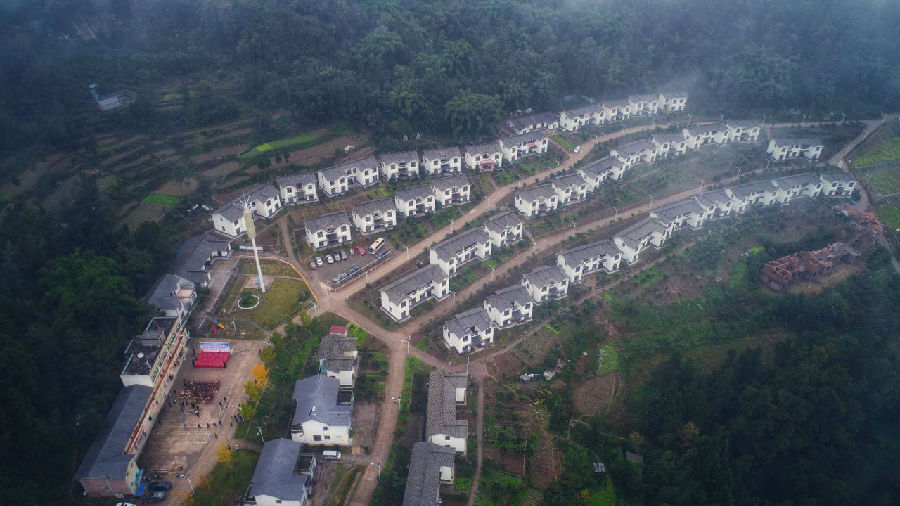 In his report at the 19th National Congress of the Communist Party of China, Xi Jinping said, “We should mobilise the energies of our whole Party, our whole country, and our whole society, and continue to implement targeted poverty reduction and alleviation measures.”
In his report at the 19th National Congress of the Communist Party of China, Xi Jinping said, “We should mobilise the energies of our whole Party, our whole country, and our whole society, and continue to implement targeted poverty reduction and alleviation measures.”
In line with the deployment and requirements of the Ministry of Education’s fixed-point poverty alleviation, the Open University of China (OUC) has continued to leverage its own advantages in distance education, operational system, information technology, and learning resources to work hard at targeted poverty alleviation through information technology, resulting in clear and significant achievements.
From 30th to November 3rd October , 2017, China RTVU News journalists were invited to participate in OUC Sichuan Branch organized activities called “Leveraging RTVU Advantages to Beef Up Targeted Poverty Alleviation in Sichuan Province - Probing the RTVU’s Targeted Poverty Alleviation Scheme in Sichuan.” Visits to RTVUs in Sichuan, Guangyuan, Bazhong, and Leshan revealed OUC system-wide achievements in implementing targeted poverty alleviation measures.
I. Cultivate leaders in shaking off poverty, and generating prosperity in rural areas
“With the development of times and the fast development of science and technology, I am more and more aware of knowledge’s importance in effective rural management,” said Party secretary Yang Bin of Pipa Village, Pingjiang County, Bazhong City, who then added, “The RTVU’s distance learning approach and flexible class time perfectly accommodated my limited scheduling availability.” In March 2016, Yang Bin enrolled in Bazhong RTVU’s rural administration major in the junior college’s “One College Student Per Village Programme.” By putting what he learned into practice, he has established two planting and breeding professional cooperatives, and five family farms to expand breeding and planting industries. Chinese medicinal plantings have reached 600 mu (equivalent to 40 hectares), generating a per capita income of 5,000 yuan, and a collective annual income of 2 million yuan. By the end of 2016, the villagers’ annual net income reached an average of 11,050 yuan. He became nationally famous as “a secretary on crutches,” and was awarded several honorary titles, such as the Fifth National Self-Established Model. In May 2014, he was received by General Secretary Xi Jinping of the CPC Central Committee, and Premier Li Keqiang of the State Council.
 Aerial photograph of Pipa Village
Aerial photograph of Pipa Village
The pilot “One College Student Per Village Programme” (hereinafter referred to as “One Per Village”) of the Ministry of Education (MOE) was launched in 2004, and it was up to the OUC to make specific implementations that to cultivated village talents who knew policies and theories, and were able to manage. As one of the first pilot schools, Sichuan Branch tapped 44 tutorial centres which offered 11 specialties across four categories: agricultural technology, forestry technology, animal husbandry, and veterinary and agricultural management. The pilot covered rural areas around all 21 cities and prefectures in Sichuan, and saw a total enrollment of 9,599 “One Per Village” students. To date, 5,825 students have graduated from the programme.
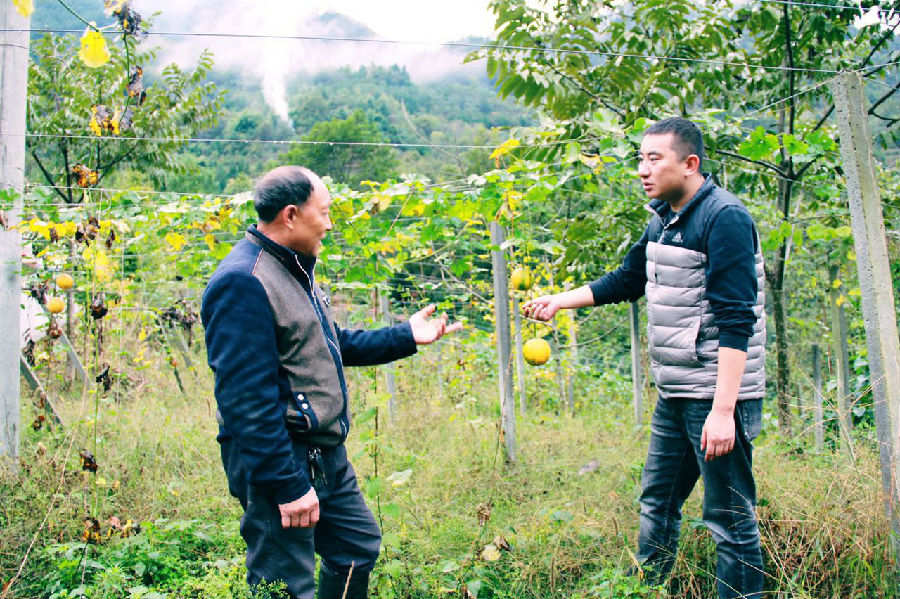 Xing Yuechuan (right) tells villager Wang how to plant fructus trichosanthis
Xing Yuechuan (right) tells villager Wang how to plant fructus trichosanthis
“To lift ourselves out of poverty, it’s first necessary to access education,” said Xing Yuechuan, the first Party secretary of Qunli Village, Qingchuan County, Guangyuan City, to the OUC journalist. “I was under great pressure due to lack of knowledge and ability in practical work. To fulfil my wish of doing well in both work and learning, I finally entered Guangyuan RTVU as an undergraduate Chinese Language and Culture student in the 2017 class. Thanks to the RTVU, I have expanded my knowledge and improved my language ability, which helps me in my work.” In his two years of work as the first Party secretary, Xing Yuechuan has visited all 56 poverty-stricken families in six production teams, and taken measures to provide help to the families that meets their needs, such as building biogas digesters, roads to connect households, and cement yards, renovating public facilities, improving villagers’ living environment, focusing on industries for development, and sending money and support funds. Another 218 mu (about 14.5 hectares) of fargesia porphyrea have been planted, along with 80 mu (about 5.3 hectares) at a fructus trichosanthis demonstration park in Qunli Village. This has brought each poverty-stricken household an average income increase of 2,000 yuan per year. Zhang Ling, a graduate of Guangyuan RTVU’s Wangcang Branch School, served first a secretary and then as Party secretary in Liuya Village, and worked tirelessly to bring knowledge-based reform. She founded the “1+6” public service center, and improved public infrastructure to help villagers develop breeding and planting programmes. Great changes have taken place in the village with outstanding outcomes. As OUC students, they have not only improved their own knowledge, but also been able to use what they have learned in rural construction and management. Meanwhile, they have also turned to teachers for help, asking them to give lessons to villagers so as to lead villagers in making progress together.
II. Community education becomes a significant path in targeted poverty alleviation
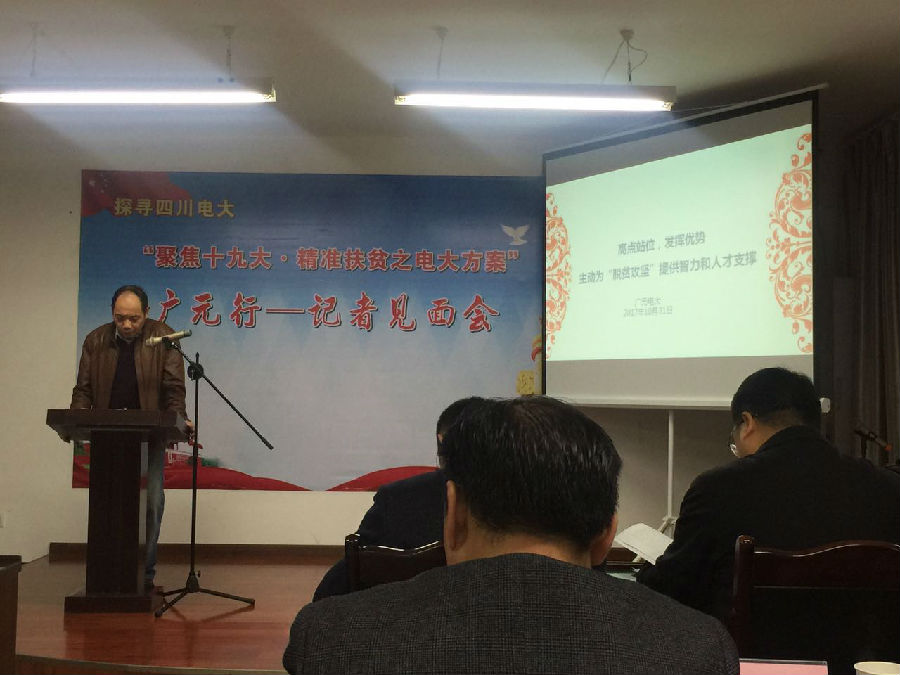
According to Guangyuan RTVU president Ma Jun, the university has made great effort to explore new models of integrating community education and farmers’ night schools. They have performed field visits to poverty-stricken villages, and given a total of approximately 100 on-site lessons, making known policies on livelihood and laws, educating on gratitude, and training on breeding and industrial development. The teams have offered support on industrial development in line with the needs identified in rural areas. At the same time, continuing education has been given to teachers, and trainings to civil servants, Party cadres, and specialized technicians throughout the city.
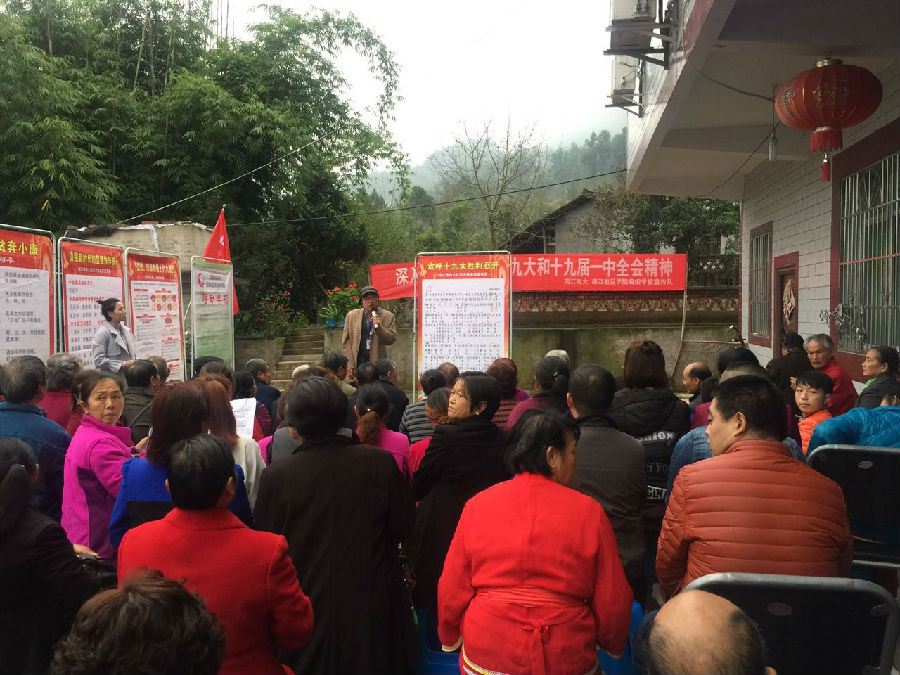
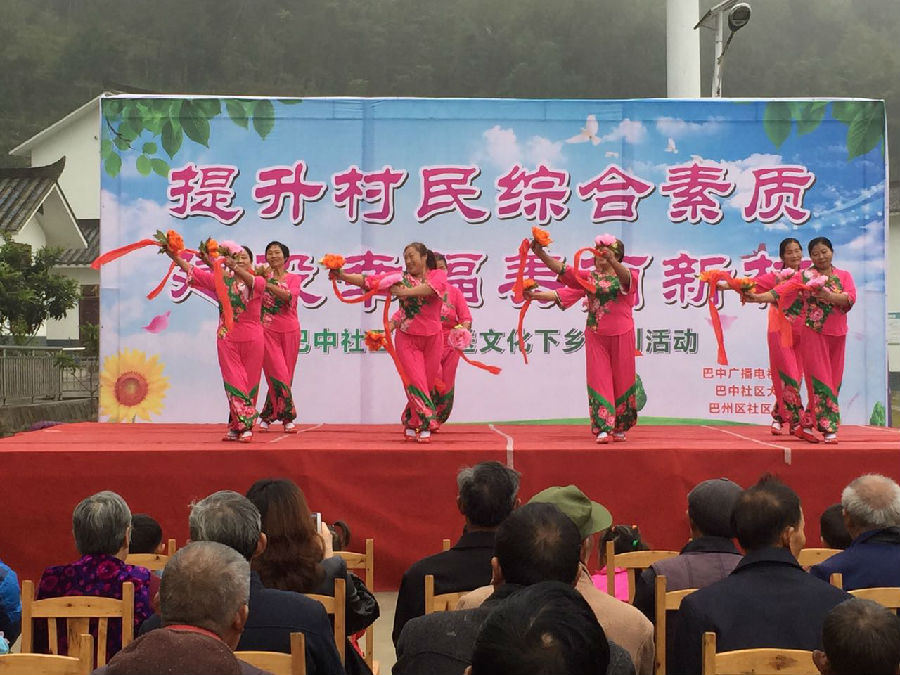
In Bazhong, the journalist witnessed rural teaching activities held by Nanjiang RTVU Community School’s Shoulder Pole School Propaganda Team. In classes, volunteer teachers taught villagers the song “Cheering for the Convening of the 19th National Congress of the Communist Party of China.” The spirit of the Party’s 19th National Congress was thus publicized to the villagers. When the journalists were in Pipa Village, it was high time for Bazhong RTVU and Bazhong Community University to hold a cultural activity called “Raising the Overall Quality of the Villagers to Build Happy, Beautiful, New Villages” in the countryside. The senior students of the Community University sang and danced with villagers in an extraordinarily lively atmosphere. At farmers’ night schools, Bazhong RTVU created four classes, both fixed and mobile, establishing a “Bazhong learning network of lifelong learning for all” and launching a “farmer night school.” Over 20,000 teaching materials were handed out to farmers, while teachers were organized to give lectures at regular intervals. Exquisite classes have been given by teachers across large rural areas, and practical technology exchange groups bring exposure to rural residents. A hotline to request live technological support regarding industrial development was also launched. Bazhong RTVU carefully forged the “Bashan Aunt” housekeeping service brand, training more than 1,200 women from poverty-stricken rural families free of charge.
The OUC’s community education has made progress, and in doing so contributed to the construction of a learning society where “everyone can learn anywhere, anytime.” Community education outreach to rural villages and townships, and flexible class time in diversified forms, have all combined to allow for the OUC to carry out significant targeted poverty alleviation.
III. Actively joining targeted partner poverty alleviation
In May 2017, Cangxi County was selected for the OUC’s “Long March Belt,” which aims to alleviate poverty through education. Cangxi RTVU implemented the project. In September 2017, the first classes for grass-root rural cadres opened with eight specialties, including rural administration, and saw an enrolment of 218 students. Cangxi RTVU also provided opportunities for children from poverty-stricken families to receive higher education free of charge, and sponsored students in need to complete their education. Two annual free trainings, with each lasting one week, are also available for professional community education cadres. Meanwhile, trainings were also been given for local Hongyang kiwifruit industry development, chuanminshen ginseng industry development, rural tourism development, and indigenous intangible cultural heritage, to name a few.
President Che Mengliang of Cangxi RTVU said, “We will strive to do a good job in the building of the OUC’s Cangxi Study Centre to make it an incubator for targeted poverty alleviation through education, including the cloud classroom, computer room, demonstration of a national e-learning center, and studio. With the OUC’s “Long March Belt” targeted poverty alleviation project through education, Cangxi RTVU is now on a “bullet train” to poverty alleviation. Harnessing the school’s great power, obvious achievements have been made, energetically boosting local economic and social development in Cangxi at the same time.”
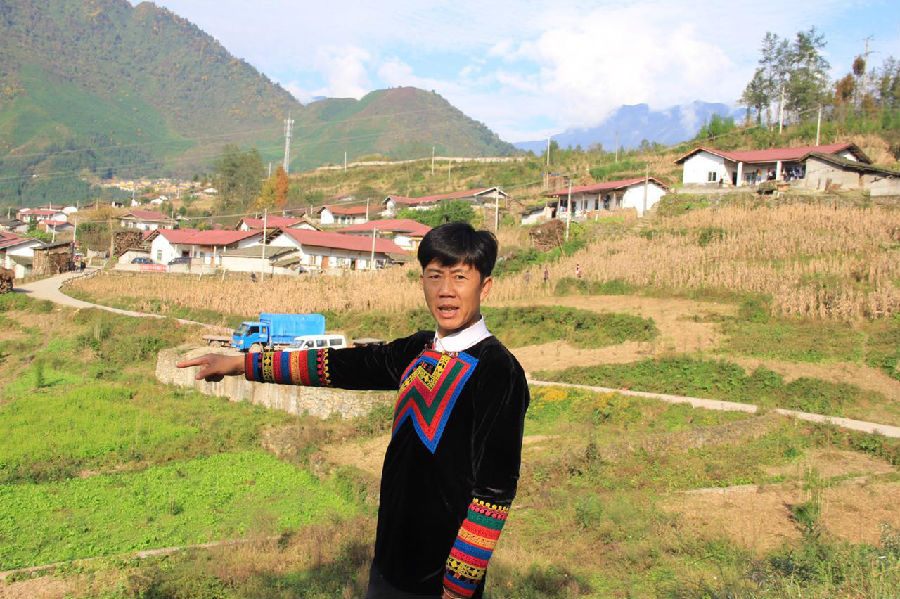 Villager Jike Gebu in Yiwu Village introduces targeted poverty alleviation
Villager Jike Gebu in Yiwu Village introduces targeted poverty alleviation
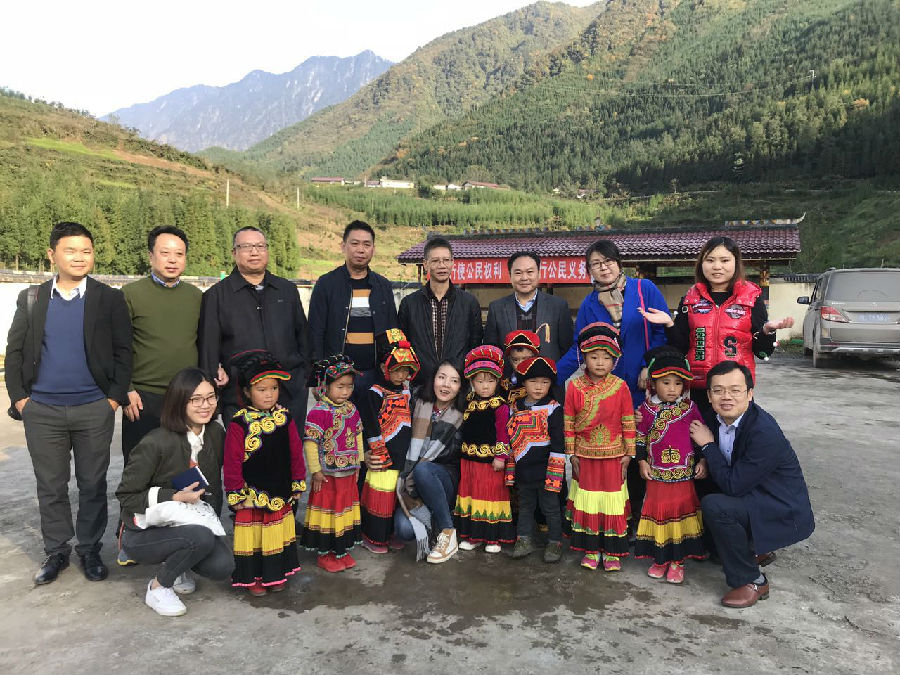
Group photo of Leshan RTVU leaders, journalists, and compassionate volunteers with Yi ethnic children
The journalist was then in Yiwu Village, Heizhugou Township, Ebian Yi Autonomous County. This village in Leshan RTVU’s fixed-point poverty alleviation programme twice received working groups and first Party secretaries who helped alleviate poverty. President Yu Xianghua visited the village several times to issue frontline instructions. Leshan RTVU diversified its classes in the village, launched industries and projects in line with local conditions, cared for “left-behind” and otherwise in-need children, and positively helped with both production and living standards of impoverished families. The village’s former first Party secretary took the initiative to secure help from Ebian Transportation Bureau, and leading to the completion of the only road out of the village before the Yi people’s New Year in November 2016. The 21-year-old Qubie Maoyingsheng had twice been a dropout, who had to stay at home after her mother’s sudden death and father’s severe disease. When Leshan RTVU’s leaders learned of her situation, they enthusiastically appealed to compassionate volunteers for help. Qubie was able to return to school, and became Yiwu Village’s third overall and first female university student. Villager Bula Yizhe was diagnosed with acute myeloid leukemia in 2017, and Leshan RTVU’s new first Party secretary Ji Biao conducted a timely fundraising. Bula Yizhe’s elder brother said to the journalist, “If there was no assistance from the RTVU, the results would have been unimaginable, because families like ours would not be able to afford the treatment.”
By Jiang Yanyan, OUC